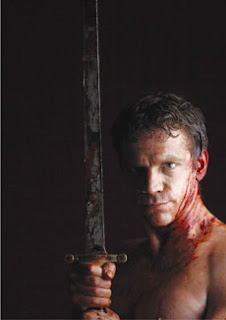It has not been interpreted too many times, though it was played at Stratford last year and there is a memorable 1984 BBC DVD. It formented a riot when it was played in 1935 in Paris and was banned in Germany during the 1930's. Whilst not wanting to yank the play out of its context (the Freudian interpretations of Coriolanus during the 70's and 80's did enough of that), its central theme of democracy and war cannot but through contemporary events into a different light. Much is made of Western democracy's debt to Greece for its political ideas. But there is a a harsher reaction to democracy than even Plato's in the work that captures an unchanging facet of the ideological and political outlook of the British ruling class.
The play's main democratic political forces are the people's tribunes Brutus and Sicinius. The names are enough to indicate how an audience is meant to perceive them, of course and it is they that indirectly percipitate Martius (the main character's name before he is honuored for his bravery and renamed Coriolanus) first bought of apocalyptical rage. It is a focused political rage aimed at the people - the "rabble" that occupy the stage in the first scene. He hurls abuse at them calling them 'curs' 'hares' 'scabs' and so on, sneering at them for their lack of knowledge, "They say? They'll sit by th'fire and presume to know What's done i'th' Capitol...making parties strong and feebling such as stand not in their liking Beow their cobbled shoes" for being untrustworthy "You are no surer, no, Than is the coal of fire upon the ice" and dangerous, "[They] will in time Win upon power and throw forth greater themes For insurrection's arguing." whilst in passing calling for them all to be hanged four times before the first scene comes to an end. The first rant ends with the great line "Go get you home, you fragments".

Martius is furious at the people's gaining representation and his rage pushes him to accept war with neighbouring Antium. This decision, though excellent in the short term for him and the ruling class he represents, initiates the tragic events that will end in his being cut off. The people's forces intervene throughout the play as they scheme and plot to be rid of what they see as a potential tyrant. They help overturn the peoples' 'decision' to elect him consul and goad him into another fit of rage which culminates in Coriolanus' banishing himself from the city. In the second half of the play he is exiled and his 'psychological' and political disintegration accelerate until, after taunting his erstwhile rival in the Antium Parliament, he is stabbed to death by him.
In nearly all interpretations of the play, Brutus and Sicinius are represented in dark clothes, speaking conspiratorially and epitomising all the terrible insults poured on the people by Coriolanus himself. These representations and emphases, though, do not represent the opinions of Shakespeare, of course. His political opinions are totally obscure to us. The interpretations of the main characters in this political play reveal only the political context within which the play has been played and the directors' own political slants. Thus, the 1984 BBC version reflects to some degree the political victories of the Conservative government five years before. the film, though tremendous in many respects, portrays Brutus and Sicinius as villanous brutes. 1984 was the near zenith of Thatcherism and it is interesting to see an eighties interpretation of a work by Shakespeare who was writing about his interpretation of Plutarch's perspective on this monumental series of events nearly two millenia ago. It is as if one is viewing something ". . .on the Tarpeian rock, That the precipitation might down stretch Below the beam of sight".
But more contemporaneously, it is a reminder of how arrogant politicians override the people and throw their countries into pointless wars. Blair in some ways is like Coriolanus only the former is too slimey a shit to shuffle of his mortal coil as any half-self aware failed politician/tragic character would. Blair, the political pugilist, despised the people too - I imagine him as we all trudged past Downing Street on Februaru 15th 2003 saying "Go get you home you fragments". Only the duffer probably hasn't even read the Reader's Digest version. Hang im.
|